As we continue to improve pedestrian and bicycle access to Metrorail, Metro has recently completed several improvements on the east side of Glenmont station.
Walking and bicycling are key access strategies for Metrorail, as Metro seeks to grow ridership in sustainable and cost-effective ways. As our studies have shown, accommodating new riders at our current access modal shares would be quite costly to the region. At Glenmont station, around 12% of riders in the morning arrive on foot or by bike, but there may be growth potential. Nearly 80 customers per day live within 1 mile of the station but currently park. Over 550 customers, or a third of all parking customers, live within 3 miles of the station but currently park.
To make Glenmont station more attractive and safe for pedestrians and bicycles, Metro’s Parking Office has constructed new paved pathways connecting the station to the intersection of Layhill Road and Glenallan Avenue, replacing a dirt path. Metro has completed this work as part of the Bicycle and Pedestrian Capital Improvement Program.
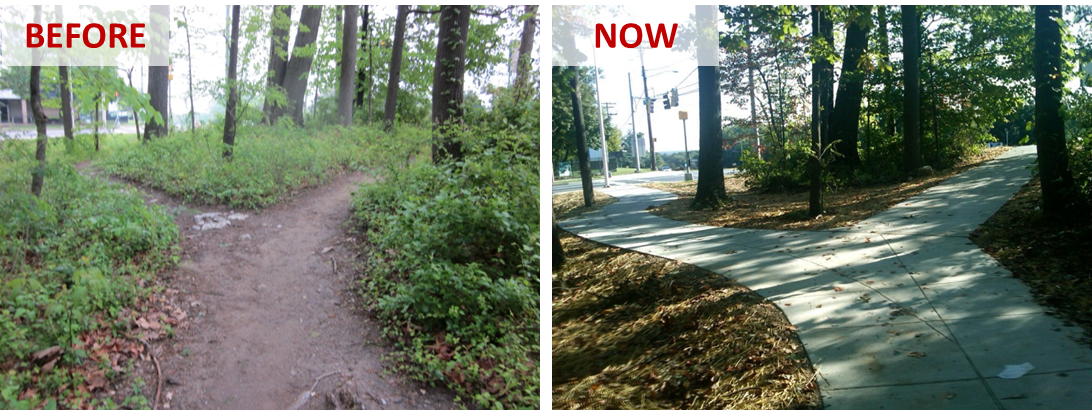
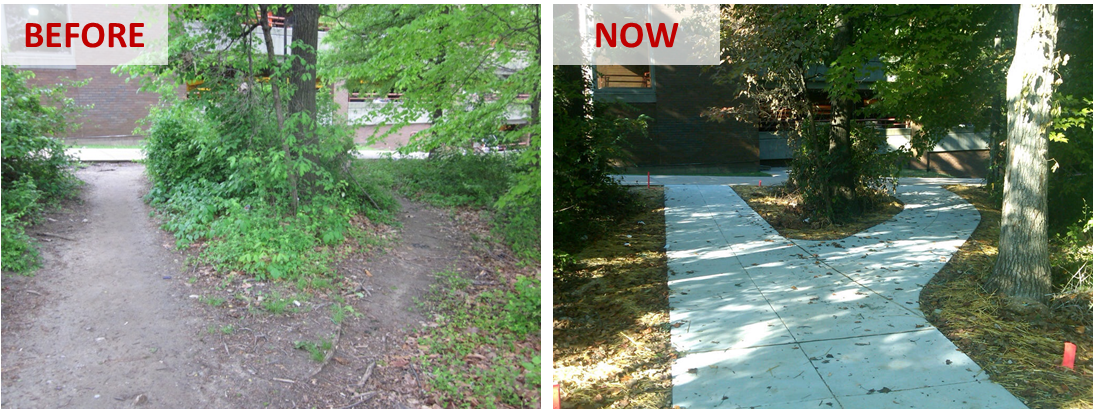
Read more…
Momentum’s outreach was unprecedented. 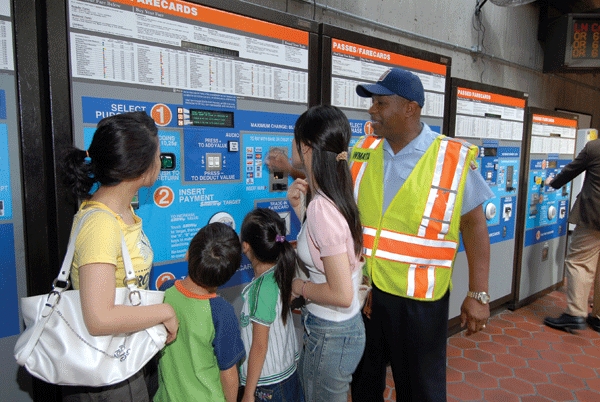 Metro staff heard from almost 12,000 stakeholders during the process, which helped inform our understanding of the public’s short- and long-term needs. Below is a high-level summary of the most commonly-held viewpoints across region:
Metro staff heard from almost 12,000 stakeholders during the process, which helped inform our understanding of the public’s short- and long-term needs. Below is a high-level summary of the most commonly-held viewpoints across region:
- Make no small plans for Metro;
- Recognize Metro is critical to the region’s future;
- Continue rebuilding;
- Reduce crowding;
- Provide better customer information; and
- Ensure predictable funding.
Elected/Public Officials
“Fix the funding problem, and be the region’s transit Authority”
Elected and other public officials were supportive of Momentum and planning for the future, though concerns were voiced that current funding levels were not sufficient to support the regions’ future needs. Major areas of focus included system capacity, regional mobility, enhanced connectivity including suburb to suburb commutes, integrating with other regional transit projects, economic development and Metro serving as the region’s transit planning leader. Specific support emerged for bus rapid transit and expanded bus services to address both core capacity and suburb-to-suburb issues and 100 percent eight-car trains to address core capacity and platform crowding. Officials also seem to agree that Metro should “be responsible for coordinating regional connectivity” by fulfilling its role as the transit planner of the region, as outlined in the Metro Compact.
During a meeting with the Maryland Congressional delegation, all members present expressed their willingness to discuss the reauthorization of PRIIA or finding other means of federal investment when the current authorization expires in 2018; however, the delegation was clear in stating that local and state officials need to take lead on securing a substantial and local capital funding commitment before Congress would act.
Read more…
Momentum’s outreach was unprecedented.  Metro staff heard from almost 12,000 stakeholders during the process, which helped inform our understanding of the public’s short- and long-term needs. Below is a high-level summary of the most commonly-held viewpoints across region:
Metro staff heard from almost 12,000 stakeholders during the process, which helped inform our understanding of the public’s short- and long-term needs. Below is a high-level summary of the most commonly-held viewpoints across region:
- Make no small plans for Metro;
- Recognize Metro is critical to the region’s future;
- Continue rebuilding;
- Reduce crowding;
- Provide better customer information; and
- Ensure predictable funding.
Since 2010, the Board of Directors 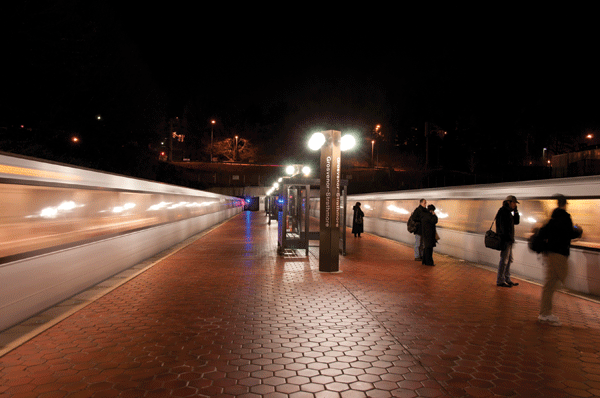 has been laying the foundation to rebuild Metro itself. From hiring a new General Manager to beginning the largest capital program since the inception of Metro, the Board has taken numerous actions to better equip the agency to succeed, including providing a stronger governance foundation.
has been laying the foundation to rebuild Metro itself. From hiring a new General Manager to beginning the largest capital program since the inception of Metro, the Board has taken numerous actions to better equip the agency to succeed, including providing a stronger governance foundation.
Under the leadership of the Board, Metro has made substantial progress on improving system safety, reforming the agency’s governance, and stabilizing its finances
The Board has made strategic investments in infrastructure, equipment and workforce training, and developed policies that have markedly improved safety, as recognized by the NTSB and FTA and documented in the Authority’s publicly-reported Vital Signs score card.
Governance reforms undertaken over the last two years have modernized Board leadership, strengthened the Authority’s governing structure, improved the Board’s partnership with the General Manager/Chief Executive Officer, enhanced internal management, and prioritized public dialogue. The Board also adopted governance reform measures that strengthened its Code of Ethics and provided its first-ever bylaws, which detail the Board’s focus on policy, financial direction, oversight and Metro’s relationship with its customers and jurisdictional partners.
Read more…
Thanks to its funding partners, Metro is now 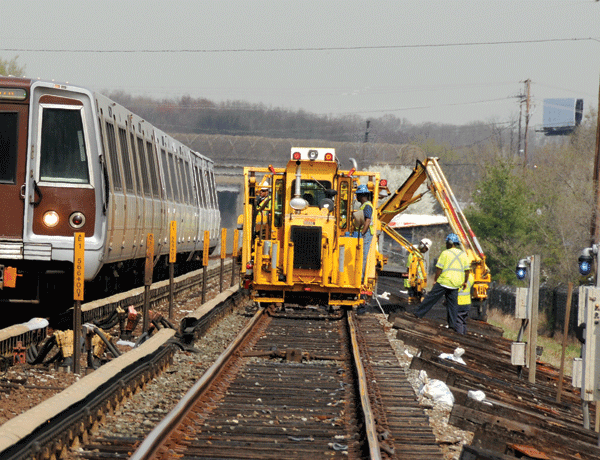 engaged in the largest capital improvement program since its original construction. Two years ago, MetroForward was launched – an aggressive, $5 billion, six-year investment program to rebuild the system. MetroForward is investing in what Metro’s customers value most: safety, reliability, and good customer service. With continued investment, it is projected that Metro will continue to make progress on the intensive MetroForward “catch up” phase in the years ahead. MetroForward has already delivered:
engaged in the largest capital improvement program since its original construction. Two years ago, MetroForward was launched – an aggressive, $5 billion, six-year investment program to rebuild the system. MetroForward is investing in what Metro’s customers value most: safety, reliability, and good customer service. With continued investment, it is projected that Metro will continue to make progress on the intensive MetroForward “catch up” phase in the years ahead. MetroForward has already delivered:
- An aggressive escalator rehabilitation program;
- Continued improved elevator availability;
- Station repairs at Judiciary Square, Shady Grove, Rockville, White Flint, Twinbrook and Union station;
- 461 new MetroAccess vehicles in service;
- Over 200 new replacement or rehabilitated buses in service;
- Electrical upgrades to accommodate additional eight-car trains on some lines; and
- Replacement of over 14.7 miles of rail; 36 No. 8 guarded switches; 16,000 ties; 11,731 cross ties; 62,723 linear feet of running rail; 20,745 fasteners; 8,849 insulators; and 9,829 linear feet of grout pads.
Read more…
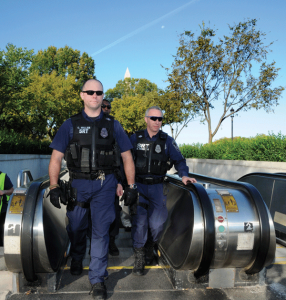 Metro’s Board took the lead in building a safety-first culture by establishing the Safety and Security Committee. Metro has also adopted an analytical approach to prevent incidents by employing smart technology and identifying hazards early. All of Metro’s efforts to improve safety since 2010, including increased communication and analysis, have been recognized by the Federal Transit Administration (FTA) and the National Transportation Safety Board (NTSB).
Metro’s Board took the lead in building a safety-first culture by establishing the Safety and Security Committee. Metro has also adopted an analytical approach to prevent incidents by employing smart technology and identifying hazards early. All of Metro’s efforts to improve safety since 2010, including increased communication and analysis, have been recognized by the Federal Transit Administration (FTA) and the National Transportation Safety Board (NTSB).
The actions over the last two years include:
- Deploying safety officers and Metro Transit Police geographically based on hazard reporting, analysis of crime statistics and identified “hot spots”;
- Installing hundreds of security cameras and video technology on buses, to decrease the occurrence of incidents and improve alertness;
- Closing all ten recommendations of the FTA’s State Safety Oversight Audit;
- Completing six internal safety audits, making Metro current with the three-year cycle required by the System Safety Program Plan;
- Continuing to develop the confidential close-call reporting system;
- Developing a Fatigue Risk Management System, a Fatigue Executive Steering Committee, and hours of service maximums to effectively address fatigue throughout the Authority; and
- Closing seven NTSB recommendations, submitting fourteen for closure, and continuing progress on six.
Read more…







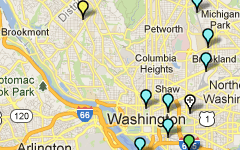
Recent Comments